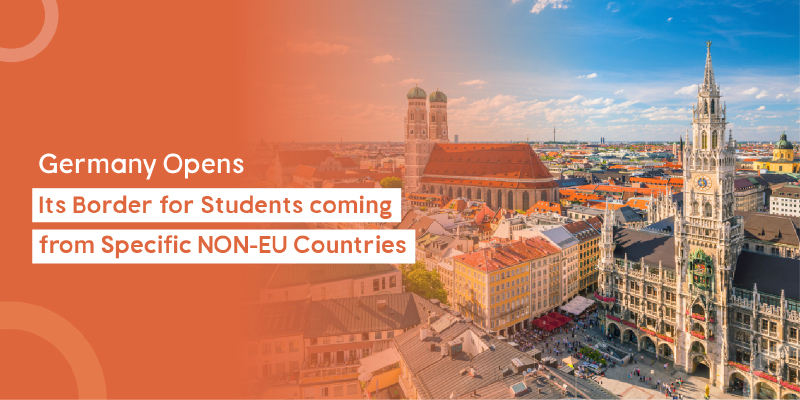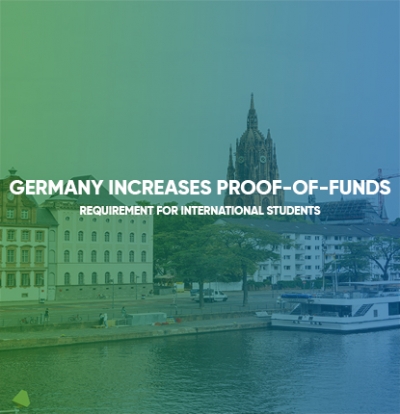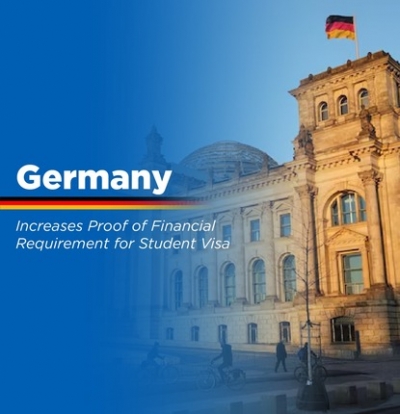Germany has lifted the border for international students coming from specific countries outside the EU. This has given a glimmer of hope to many international students. Studying in Germany has been on the bucket list of many international students. So lifting travel restrictions would be the greatest news for those you planned to study this year.

Germany’s preparedness to welcome international students
Germany is prepared to welcome international students. The country has a network of centres of excellence and specialist clinics that are the best in the world. They have a very good disease warning and notification system, as well as an excellent pandemic preparedness plan.
Internationals allowed from non-EU countries to Germany
First entry by nationals of non-EU countries (third-country nationals) is permitted without restrictions on travel for persons residing in a country on the below list of safe countries. Germany allows entry of students from the following non-EU countries:
- Albania
- Armenia
- Azerbaijan
- Australia
- Bosnia and Herzegovina
- Brunei Darussalam
- Canada
- Hong Kong
- Israel
- Japan
- Jordan
- Kosovo
- Lebanon
- Macao
- Moldova
- Montenegro
- New Zealand
- North Macedonia
- Qatar
- Serbia
- Singapore
- South Korea
- Taiwan
- Thailand
- USA
Travel limitations on non-EU nationals not on this list:
Students coming from non-EU countries, which are not listed in safe countries are permitted to enter Germany to begin quality vocational training, but only on some conditions:
- The student has a visa for training or education in Germany (after completing a language course, if applicable).
- The student presents documents from the training institution stating that the candidate’s presence is necessary as in person despite the current coronavirus situation.
Other reasons for traveling to germany are
1. Entry into Germany for the purpose of completing a university course of study or individual semesters of study
Students are required to present an admission letter issued by the university.
2. Students are required to present an admission letter issued by the university.
This includes attending special language classes before enrolling in a school if the student can present that they have already registered to attend the school. The planned stay must be a minimum of 6 months.
3. Entry into Germany for the purpose of attending a language course to prepare for subsequent training
It is permitted if the person presents upon entry that the training will begin immediately after the completion of the language course without any intervening travel home.
4. Entry into Germany for measures to recognise professional qualifications acquired abroad-
The student must present documentation from the university confirming that the student’s presence is necessary in person and not only online despite the current coronavirus situation.
5. Au pairs
Au pairs, participants in voluntary service, trainees and participants in vocational training measures or language courses can also enter Germany on some conditions. A proof of the reason for entry must be provided. The planned stay must be at least 6 months.
Rules for fully vaccinated travellers
For fully vaccinated people, entry from third countries has been permitted from 25th of June 2021. The traveller must have been vaccinated with all the doses that are necessary for full vaccination. If the person who has recovered from coronavirus only one dose is necessary which must be at least 14 days before the date of travel. The EU Digital COVID Certificate or comparable vaccination proof in German, English, Italian, French, or Spanish must be presented on arrival.
Currently accepted vaccines in Germany
- Pfizer
- AstraZeneca
- Moderna
- Janssen
The vaccination certificate must include the subsequent details-
- Personal data such as first and last name and date of birth.
- Date/s of vaccination and number of vaccination doses.
- The name of the vaccine.
- The Details of the person or institution responsible for vaccinating the person.
- Confirmation with the qualified electronic signature or qualified electronic seal of the person who carried out the vaccination. If this is not possible due to administrative reasons, a suitable format such as a stamp or state symbols should be used
Given the uncertainty surrounding vaccination for young people, unvaccinated children under 12 years old are allowed to enter Germany if they present proof of a negative test result and travel with at least one fully vaccinated parent.
Also read:
Checklist Before going to Study in Germany
Top Reasons to Study in Germany
7 Amazing Places to Visit When You are Studying in Germany






 Study in Germany
Study in Germany
Categories: Germany
Tags: Study Abroad